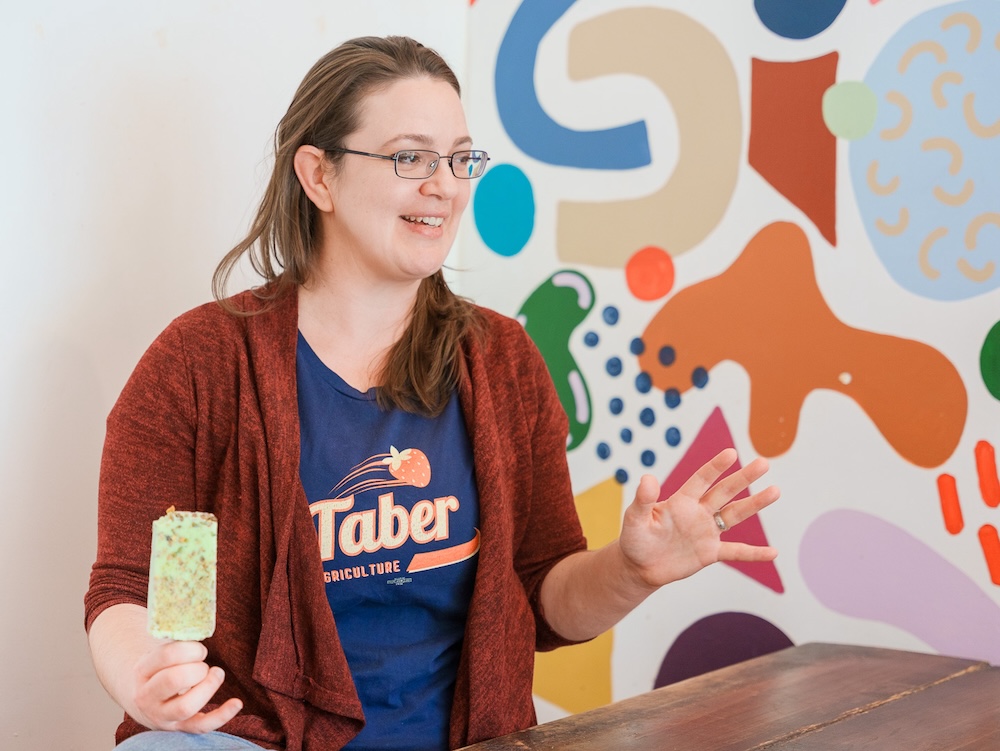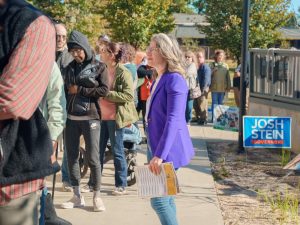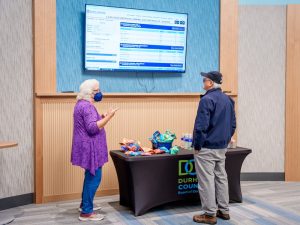This election season, The 9th Street Journal is sitting down with candidates to chat about their priorities — over frozen pops.
Our reporter Lauren Pehlivanian spoke recently with Sarah Taber, a Democrat who is running for commissioner of agriculture against Republican incumbent Steve Troxler. The interview has been edited for length and clarity.
Lauren Pehlivanian, The 9th Street Journal: Many North Carolina voters may not know what the Commissioner of Agriculture does. Why should voters care about this race?
Sarah Taber: This seat gets called the “governor of rural North Carolina,” which is adorable, and it is not correct.
Tell me what issue you care about, and I can tell you how the commissioner of agriculture impacts it.

Food prices: I like to say, “Raise your hand if you buy food.” [Say you go] to the store, you get a pound of bananas, and they charge you for a pound and a quarter. We found that multiple chains have been systematically overcharging people this way. There is somebody in state government who’s supposed to work with businesses to check their scales and make sure they’re charging people appropriately. That person is the commissioner of agriculture.
Animal shelters: North Carolina has one of the highest kill rates in [animal] shelters in the country. Making sure animal shelters are functioning properly is under the commissioner of agriculture.
Wildfires: Almost half our state is in forest. We’re building more and more neighborhoods into forests and we’re having longer, hotter, dry spells. So we’re going to have more fires. Guess who’s in charge of that? It’s the commissioner of agriculture.

The guy we’ve had for 20 years has been underfunding wildfire [prevention], he’s been underfunding pet shelters.
I think this job has been so overlooked for so long because people think, “Well, it’s about rural stuff, it must not matter to me.” That has allowed special interests to choose who gets to be in charge of this, at the expense of normal people.
The agriculture commissioner is not there to be king of the farmers.
9th Street: Did you grow up on a farm?
Sarah Taber: I did not. My dad was in the military, so we were moving all over the place. I came up working other people’s farms, [starting] at the age of 14. I was able to work my way through school, and got a doctorate in crop science.
After that, because I had years of hands-on experience working with different kinds of farms and had that scientific training, I said, “Hey, farmers, if you are having financial problems and you want to switch to crops that make more money, call me. I will help you do it.”
That’s what I’ve been doing for the last decade. [I’m] proud to say it’s worked. Every single one of my farmers are still in business today, which is weird in agriculture.
There is a lot more opportunity in agriculture and food than I think a lot of people realize.

Sarah Taber: I think he’s certainly done well with the State Fair. That’s all a lot of people know about the commissioner of agriculture. I think he’s used the state fair to portray to the people of North Carolina that he’s doing a good job.
He uses statistics that make it look like our farm sector is growing, to make it look like he’s doing a good job.
It’s led North Carolinians to believe that things are going well and to not realize how urgently we need to change how we’re doing things.
Certainly we’ve lost a lot of farms under his tenure.
And North Carolina, it’s a big farm state, right? It’s a place where you can grow almost anything. But when you walk into our grocery stores, almost everything in there is imported from out of state. And that is driving up our food prices.
The guy I’m running against is the most popular politician in North Carolina. So when I started running, people were like, “Are you nuts?”
People assume he has so much rural support. He actually lost 11 rural counties last time.
There’s a whole lot of people in the state who vote for Democrats for just about every single position. But for this race, they go over to Republican because a lot of people are like, “I’m bipartisan. This is my chance to prove it. I know farmers love Republicans.”
9th Street: Part of your platform is about promoting higher-revenue crops, like berries, fruits, and even cannibis. What would you do to promote these?
Sarah Taber: Farmers in our state are making as little as half as much per acre as their peers in Georgia and Virginia.
A question I get frequently is, “How are you going to make farmers change?” And I say, “Girl, you can’t make people change.”
That’s not the issue here. The issue is, you make people aware of what their options are.
9th Street: You mentioned hog farming. That’s a huge industry in North Carolina, but has also come under fire for the environmental issues it causes. As agriculture commissioner, do you think you have a responsibility to tackle those environmental issues?
Sarah Taber: In much of rural North Carolina, you’ve got counties where 80% of the jobs come from the hog industry. So what folks have been trying to do to get ahead of the hog industry is: regulate and lawsuits. Well, I think that’s gotten as far as it’s ever going to get, to be honest with you.
When you control 80% of the jobs in the county, you are God.
Why haven’t we done anything about that? Why have we not done anything to invest in those counties and build an economy that’s not hogs?
Fruits and veggies — they make a lot more money per acre. I think [growing fruits and vegetables is] a great way to support farmers, to add something that can be another support, so people aren’t wholly depending on [hogs or livestock].
A more diverse economy is always good.
9th Street: How would you attract more young people into farming?
Sarah Taber: The economy is different than it was 30, 40, years ago, when the last generation was taking on farms. For young people to take on farming, it has to be a real job. It has to make money.
And if we’ve built a farm sector that is mostly about preserving wealth instead of making money — that’s why the young people can’t get on board. It’s not that they don’t want to, it’s that they cannot.
It’s so much easier to blame young people than it is to take responsibility for this farm sector we built.
I’m 41, but in agriculture, that means you’re a kid. So I’m like, “Leave the kids alone!”
9th Street: What’s a recent book you read, and what stands out to you about it?
Sarah Taber: Honestly, Jane Austen’s “Sense and Sensibility.” I always tell people, “If you really want to understand agriculture, don’t read books about agriculture. Read Jane Austen.”
One of the biggest driving forces in agriculture is just people with big estates, who own a lot of land and don’t really necessarily think that much about it. They’re very busy having a social calendar.
That was true in Jane Austen’s time. It’s also very true here in the South today.
Above: Candidate Sarah Taber and 9th Street Journal reporter Lauren Pehlivanian, pictured at Pincho Loco dessert cafe in Durham. Photos by Kulsoom Rizavi — The 9th Street Journal
Lauren Pehlivanian






